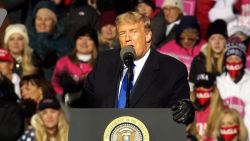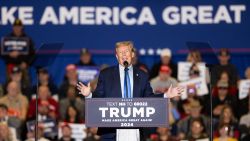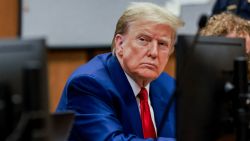The Supreme Court’s rejection of Donald Trump’s attempts to keep his tax returns out of the hands of Manhattan District Attorney Cyrus Vance is a potent reminder of this fact: The former President is in real legal jeopardy – on a number of fronts.
In the narrowest aperture what the court’s ruling means is that Vance – and the grand jury he has empaneled to look into hush money payments made in the run-up to the 2016 election to two women alleging affairs with Trump – will get a look at Trump’s most carefully guarded secret: His financial documents.
Which is a blow for Trump – especially given a) how hard he fought the release of these documents, which include years of tax returns, to Vance and b) what we already know about Trump’s involvement in the hush money scheme.
In federal search warrant documents released in July 2019, Trump is named for his involvement in the hush money payments. As CNN’s Kara Scannell and Marshall Cohen wrote at the time:
“The documents are the first time that the US authorities have identified Trump by name and allege his involvement at key steps in the campaign finance scheme. Authorities had previously referred to Trump in court filings as ‘Individual 1,’ the person who directed [Michael] Cohen to make the payments. Trump has publicly denied making the payments. Cohen pleaded guilty to two campaign finance crimes, among others, and is serving a three year prison sentence.”
Cohen, who served as Trump’s personal lawyer and fixer for years before turning on him, testified under oath in front of Congress in February 2019 that Trump had personally instructed him to pay Stormy Daniels and Karen McDougal for their silence and that there was “no doubt in his mind” that the candidate knew what he was doing.
We know very few details – beyond that he is looking into the hush money payments – about Vance’s investigation. “The work continues,” Vance tweeted cryptically after the Supreme Court announces its decision Monday on Trump’s tax returns.
But what we do know is that the Manhattan District Attorney investigation is far from the only legal matter in which Trump currently finds himself entangled. Consider:
1. The New York attorney general’s office is looking into how the Trump organization valued its assets.
2. Defamation lawsuits from E. Jean Carroll and Summer Zervos.
3. A fraud lawsuit filed by Trump niece Mary Trump.
4. A possible charge of incitement by the DC attorney general for Trump’s role in the January 6 riot at the US Capitol.
5. Two investigations into Trump’s attempts to pressure Georgia elected officials to overturn the state’s election results.
And what we also know is that the freedom from prosecution afforded to a sitting president doesn’t hold for a former president. Nor is dealing with all of these various lawsuits cheap. Nor does Trump have unlimited resources at his disposal. (In fact, his financial concerns may be even more pressing than his legal ones.)
Trump, of course, is also not unfamiliar with drawn-out court fights. He’s often bragged about his ability to use the legal system to his advantage, in fact.
“Does anyone know more about litigation than Trump?” Trump said of himself on the campaign trail in 2016. “I’m like a Ph.D. in litigation.”
The question going forward, however, is whether Trump’s old legal tactics – delay, delay, delay and hope the other side loses interest or runs out of money – will work against the considerable number of foes aligned against him.
After all, Trump’s no longer just some rich guy. He’s the former president of the United States. Which puts a MUCH larger legal target on his back.



















